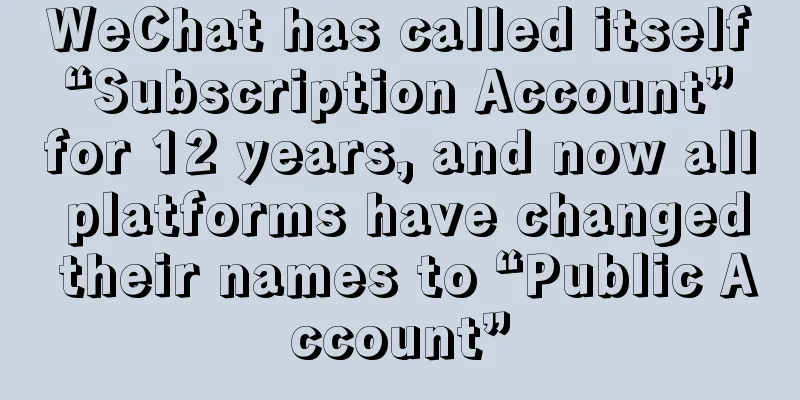WeChat has called itself “Subscription Account” for 12 years, and now all platforms have changed their names to “Public Account”

Although Tencent's WeChat has 1.382 billion monthly active users, it also makes some relatively low-level "mistakes". WeChat Public Platform was officially launched on August 23, 2012. Since then, WeChat and WeChat Public Platform have undergone many revisions, but WeChat has not discovered the bug of inconsistent names until 12 years after its operation. When the WeChat public platform was first launched, its name among content creators was “WeChat public account”. The communication object between creators was “WeChat public account”, and the contact information that creators output to the outside world and leave on other platforms was also called “WeChat public account”. However, at the user level, it has never been called WeChat Official Account, because the official account itself is on WeChat, and calling it "WeChat Official Account" is like adding stubs. The name of WeChat Official Account on the C-end is "Subscription Account", which has been used by WeChat for nearly 12 years. In November 2024, after WeChat realized that the names of public accounts were inconsistent between the creator and the user, it finally thought of changing the names of all platforms to "public accounts". According to Guo Jing's observations in the Internet circle, there are four main reasons: 1. On the WeChat App, "Subscription Accounts" are uniformly renamed "Official Accounts". After users click on the "Official Account" icon, the "Official Account" will also be displayed at the top of the screen. 2. “Subscription accounts I follow” also becomes “Public accounts I follow”. 3. The "Subscription Account Assistant" App is renamed "Public Account Assistant". 4. On the WeChat public platform homepage, “Subscription Account” was renamed “Public Account”. At this point, the names of WeChat public accounts have been unified from the WeChat App to the content creation end, and are no longer subscription accounts, service accounts, or WeChat public accounts. In the past two years, WeChat has continuously increased its investment and attention to WeChat Official Accounts, trying to reawaken the new ecology of WeChat Official Accounts. After all, on a giant App with 1.382 billion users, there is a very high possibility of user growth and traffic increase. For example, mini programs and video accounts, while the overall traffic growth rate of the Internet industry has slowed down, they still rely on the "big ship" of WeChat to maintain growth. This is the power of WeChat. Renaming WeChat official accounts is part of WeChat's efforts to reshape its brand and influence, but some creators have clearly exaggerated the role of subscription account name changes, thinking that WeChat is making such a big move, and if changing the name can have such a big impact, then the top 100 apps in the App Store might change their names once a week. In fact, WeChat currently faces two major pain points: 1. The larger the number of users, the slower WeChat's own innovation and upgrades will be. It is almost impossible for WeChat to make major revisions and upgrades like some apps. If the changes are not good, they will be criticized by users. For example, when the service account is folded, many users complained that some content was not seen after the service account was folded. Some users missed some important messages because of the folding of the service account. Since users did not know that these accounts were folded and no one notified them, they missed their own "big things" invisibly. To this day, some users are still dissatisfied with the folding of service accounts. 2. Any update of WeChat will be swallowed up like a black hole. For example, the "WeChat Status" that was once favored by the outside world, and the live photos of Apple mobile phones. At the beginning, the new features of WeChat will definitely be hyped up and the outside world will be very excited, but once this enthusiasm is over, these subtle updates of WeChat will be swallowed up like a black hole. Some users know that there is an update, but some users don't know about it. The novelty of WeChat's new features will soon be buried. As far as users are concerned, there is not much difference between calling it a "subscription account" or a "public account". Changing the name will not increase the number of users. Users will still read it. If users do not read public accounts, they will not read it even if you change the name. Maybe the creators of public accounts will be more sensitive to this, but in the end, it still comes back to the creators' content itself. Perhaps, “subscription account” should have been called “public account” from the beginning. WeChat is a long time late. |
>>: Super detailed real-life examples of user portraits
Recommend
In which country is Shopee's sales better? How does Shopee operate?
As a cross-border e-commerce platform, Shopee has ...
What is the way out for ordinary people to start their own business?
This article starts from the entrepreneurial choic...
In the Olympic marketing war, most brands find it difficult to handle the overwhelming traffic
The Paris Olympics is about to open. What are the ...
Double 11 War, starting from the lowest price
This year, all platforms adopted a low-price strat...
This inconspicuous product sold over 100,000
What are the characteristics of hot-selling produc...
2023, 5 ways to play cross-border collaboration
Nowadays, co-branding has become a common way of b...
What are the requirements for registering and opening a store on Flipkart?
As one of the largest e-commerce platforms in Indi...
After shutting down its welfare club which had been in operation for 9 years, has Xiaohongshu’s e-commerce reached a new turning point?
Xiaohongshu Welfare Club, which had been in operat...
Beijing Auto Show first day: Xiaomi booth is packed, Lei Jun is in the limelight, Zhou Hongyi becomes the "oldest car model"
On April 25, the 2024 Beijing International Auto S...
I sold milk tea coupons in the live broadcast room, and gained millions of followers in two days, and GMV exceeded 25 million
As competition in the tea beverage industry become...
What is the difference between Wish's wholesale and boutique products?
Some platforms support multiple store modes, such ...
How to open multiple stores on Lazada? How to manage multiple stores?
As one of the largest online shopping websites in ...
With over 20 million members and an annual GMV exceeding RMB 4 billion, how does Guoquan Food manage to dominate the private catering industry?
Pre-prepared meals are common to everyone. This in...
2024, the Coco Tree Coconut Juice swimsuit calendar is out again!
Although controversial, its unique marketing strat...
Mother’s Day Case Study | How to stand out through marketing?
Editor's note: Every Mother's Day, the Mom...









